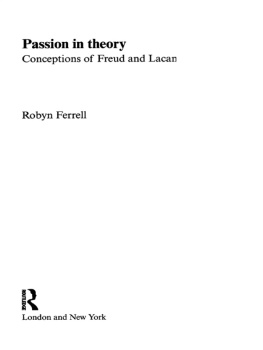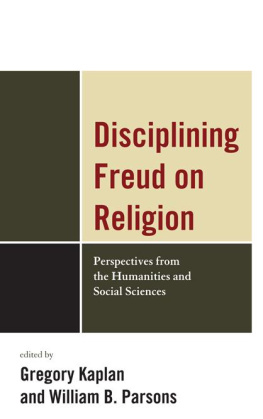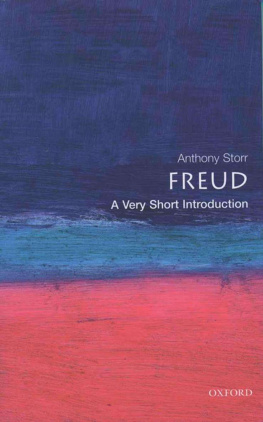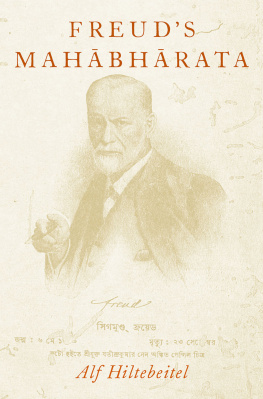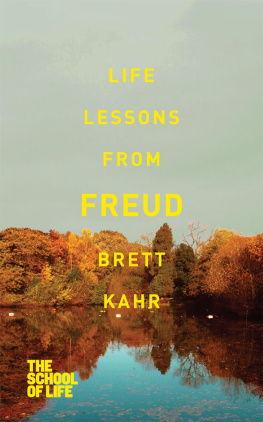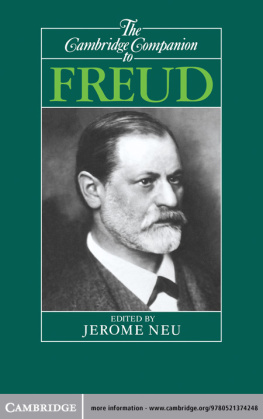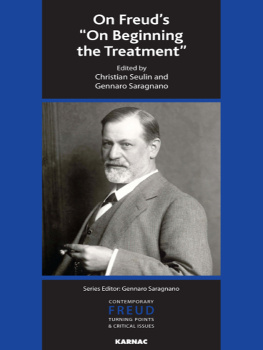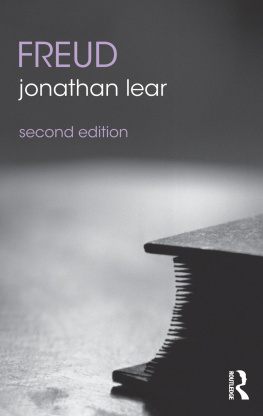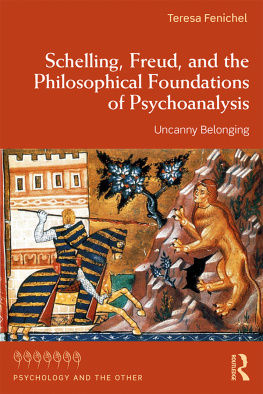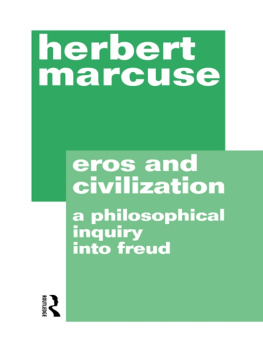REQUIEM for the EGO
Freud and the Origins of Postmodernism
ALFRED I. TAUBER
STANFORD UNIVERSITY PRESS
Stanford, California
Stanford University Press
Stanford, California
2013 by the Board of Trustees of the Leland Stanford Junior University. All rights reserved.
No part of this book may be reproduced or transmitted in any form or by any means, electronic or mechanical, including photocopying and recording, or in any information storage or retrieval system without the prior written permission of Stanford University Press.
Printed in the United States of America on acid-free, archival-quality paper
Library of Congress Cataloging-in-Publication Data
Tauber, Alfred I., author.
Requiem for the ego : Freud and the origins of postmodernism / Alfred I. Tauber.
pages cm
Includes bibliographical references and index.
ISBN 978-0-8047-8744-4 (cloth : alk. paper)
ISBN 978-0-8047-8829-8 (pbk. : alk. paper)
1. Freud, Sigmund, 18561939Philosophy. 2. Ego (Psychology)Philosophy. 3. Psychoanalysis and philosophy. I. Title.
BF109.F74T388 2013
150.19'52092dc23
2013005911
ISBN 978-0-8047-8830-4 (electronic)
IN MEMORY OF BRUCE LEWIS
A consciousness of ones own self and a consciousness of other things, are in truth given to us immediately, and the two are given in such a fundamentally different way that no other difference compares with this. About himself everyone knows directly, about everything else only very indirectly. This is the fact and the problem.
ARTHUR SCHOPENHAUER, The World as Will and Representation
On the horizon of any human science there is the project of bringing mans consciousness back to its real conditions, of restoring it to the contents and forms that brought it into being, and elude us within it; this is why the problem of unconsciousnessits possibility, status, mode of existence, the means of knowing it and bringing it to lightis not simply a problem within the human sciences which they can be thought of as encountering by chance in their steps; it is a problem that is ultimately coextensive with their very existence.
MICHEL FOUCAULT, The Order of Things
Contents
Preface
There is nothing in theory, and certainly nothing in experience, to support the extraordinary judgment that it is the truth about himself that is the easiest for a person to know.
HARRY FRANKFURT, On Bullshit
Requiem for the Ego is a curious book, a mystery story yet to find its conclusion. The egos demise has been reported, and despite bountiful evidence, the case cannot be closed. The fact of an attempted egocide (Rogozinski 2010, p. 5) seems clear enough. The actors of this drama are well known, and their declared motives and philosophical positions have been diligently rehearsed. Thus, the question is not who or why but rather what has been achieved and what lost?
The story begins with Descartes, whose cogito resides at the foundation of modernism. This Cartesian ego perceives and represents to itself the world and inner mental states from its own singular perspective. Freud adopted this subject-object divide in developing his own theory of the mind, and with that move, he joined the quandary of the ego functioning as both a subject and as an object of itself. The analytic endeavor endows the analysand with the capacity to reflect, interpret, and thereby ultimately achieve some degree of understanding about unconscious desire. This is the ego of Kant, whose autonomy, even in the Freudian context, sustains the effort to know and, more, to know the truth, by steadfastly holding on to the potential (and the integrity) of its critical faculties. However, this construction is fraught with difficulties, because the object of interpretation, the subject herself, must be presented (as a representation) to an undefinable conscious homunculus whose reflexive regression comes to no end.
When the psyche becomes an object, then the subject-object divide opens an unbridgeable space between the knowing self and its other. This construction leaves the philosophical structure of the ego intact (at least from the modernist perspective), but at the same time the obscurity of the psyche leads to a deep skepticism. Who is this intimate other who shadows my consciousness and leaves me to ponder my own identity? The cogito thus loses the certainty of the Cartesian self as its individual insularity has been compromised. Indeed, the psychoanalytic ego has been conceived with contradictory characteristics: Facing an irredeemable obscurity within its own psyche, the subject still claims autonomy and self-knowledge. The identity problem is hardly confined to the psychoanalytic scenario but extends throughout Western self-consciousness. We are all Freudians in the sense that man no longer knows what he is; but simultaneously also knows that he does not have the answer (Scheler 1958, p. 65). In short, the minds irresolvable division leads to alienation, where the egos self-knowledge becomes a problem.
Freuds own ambivalence about the ego he entrusted to enact his therapyendowed with analytic rationalityproved prescient as philosophical assaults against modernism, and the ego more particularly, gained momentum. He ironically contributed to the efforts that would dislodge notions of autonomy by positing a knowing agency that has proven unstable and subject to the very forces from which it seeks to distance itself. Consequently, even though Freud offered a portrait of agency with interpretive capacities and various degrees of autonomy, he also described the subject as fragile and vulnerable to its own inner psychic forces. I have previously described this multilayered depiction of personal identity in the context of measuring Freuds humanism against his science ideal, where he appears as neither a systematic philosopher nor the positivist scientist he hoped to be but rather as a moralist (Tauber 2009a, 2009b, 2010) and social reformer (Tauber 2012a). Committed to Enlightenment ideals, he believed in the power of reason, the autonomy of the individual, and the potential for assuming ultimate responsibility for human being. Balancing a well-acknowledged pessimism, he still offered a way of understanding the psyche, which he put to work as a psychotherapy. In that effort he sided with a fragile optimism, working to redeem his patients from their suffering. That venture rested on a humanistic understanding of agency that would suffer grievous assault. After all, as the last great metaphysician of modernity, Freud posed the cardinal question of our era: Will the humanism he hoped to protect be saved? This dramaFreuds defense of human autonomy (albeit severely compromised by unconscious forces inimical to its apparent ideals) versus those who would dismantle this notion of agency altogethertakes place on a large stage.
While Freud held a rear-guard action to save the cogito, his early philosophical inquisitorsprincipally Theodor Adorno, Martin Heidegger, and Ludwig Wittgensteinsaw no feasible defense and gave no quarter in their deconstruction of the modernist ego. The subject observing the world and herself dispassionately was, in their view, a conceit, and more, such a conception of subjectivity supported those oppressive forces that constricted human potential. Freudianism thus became a target of a wide-ranging philosophical revolt against a discarded epistemology, and with that revision, subjectivity would be reconfigured in tandem. Requiem for the Ego describes how Freuds description of the ego united the key revisionists of the Enlightenment understanding of agency as they crossed the historical inflection point marking modernitys slide into postmodernity. From radically different orientations, Adorno, Heidegger, and Wittgenstein attempted to disassemble the very foundations of the Freudian ego, not so much as a discredit of psychoanalysis but rather as part of the larger project of overturning the Cartesian-Kantian representational philosophy of mind. Each of Freuds antagonists concurred that the metaphysics of a knowing ego observing its inner psyche cannot be sustained as a basis for understanding personal identity. This theme, which unifies otherwise disparate philosophies, exposes the Achilles heel of the psychoanalytic project and provides a fecund means by which to understand Freuds theory and, more broadly, the key conceptual sources of postmodernism.
Next page

